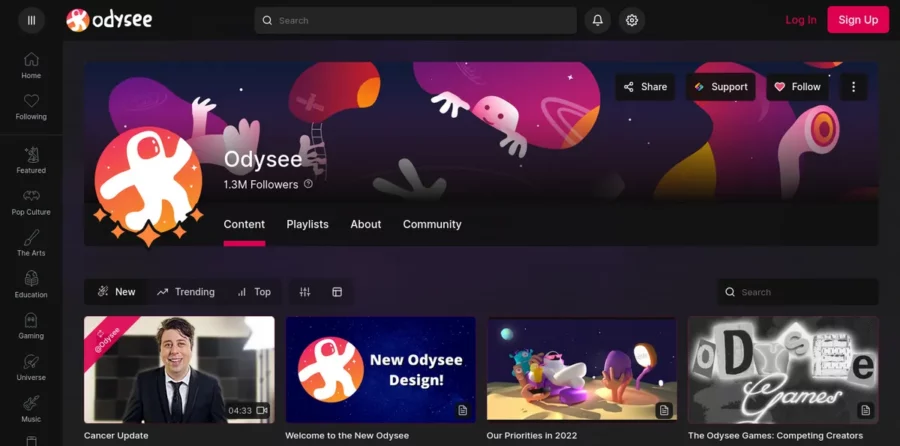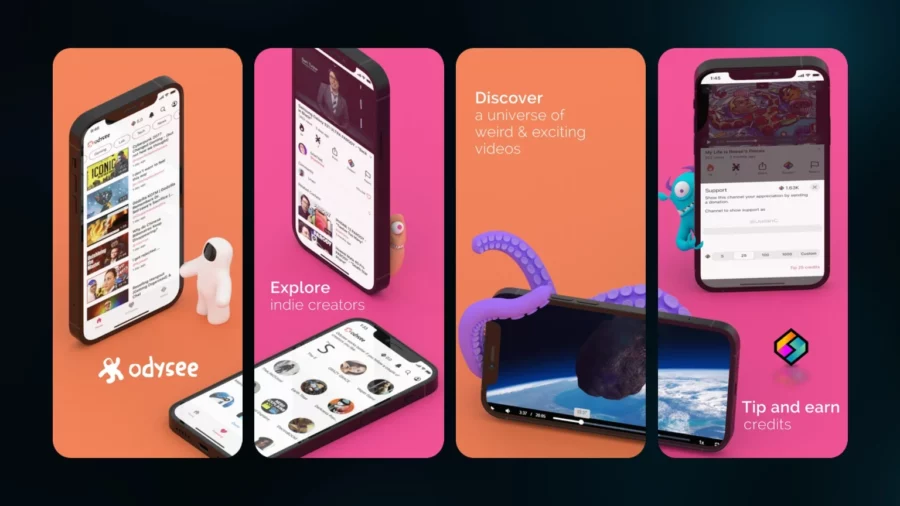Odysee is a YouTube alternative. It has a wide range of videos. It offers music, news, and pop culture. Odysee, a video hosting platform similar to YouTube, was launched at the end of 2020 after a beta version went live in September. Odysee’s user interface is nearly identical to YouTube’s.
[fvplayer id=”457″]
Users can upload videos to their channels, viewers can like and comment on videos, and the homepage contains a list of popular topic kinds of videos that are trending on the site.
How to buy Odysee stocks?
The LBRY protocol is a blockchain and BitTorrent-based decentralised file-sharing and payment network. It allows anyone to create an account and store content that the company cannot delete. The company has not announced yet about the stocks but Once Odysee stock is listed we will update the article and let you know the details. This app has thousands of downloads.
Why is the Odysee app an appealing option?
Odysee is not a platform for the far or extremist content creators by definition. Many people use it primarily as a backup or secondary library. Odysee, on the other hand, is an appealing option for YouTubers who have been banned or demonetized. Since beta testing started in September, the platform has attracted 8.7 million users, indicating that it has the potential to reach a large audience.

Far-right commentators such as right-wing academic Jordan Peterson, alt-right YouTuber Tarl Warwick, and MAGA pundit Elijah Schaffer, who took part in the US Capitol insurgency and popularised the false narrative that the 2020 election result was illegitimate, are among the most popular channels.
Best features of the Odysee App
Despite these similarities, Odysee has a few key differences, most of which are due to its underlying architecture. Odysee was created by the same team that created LBRY, a blockchain protocol, unlike big tech companies. While YouTube stores video uploads on its centralised servers, Odysee functions as a peer-to-peer exchanging data distributed over a network, avoiding the use of centralised servers.
This underlying technology isn’t entirely new. Bitcoin and other cryptocurrencies use the same blockchain technology, which is a more advanced version of earlier upload/download peer-to-peer systems like torrents. Odysee is also based on open-source software that is developed by the public rather than managed by corporate developer giants. Through a vast spread, transparent, and discoverable network, the data itself is kept safe. This public dimension, on the other hand, means that digital information is not subject to government or industry regulation.

Odysee’s income generation model is another defining characteristic. While most YouTube creators rely on ad revenue depending on the number of views, Odysee provides three different ways to make money. The first is earnings per view, in which users with verified accounts receive payments in the form of LBRY Credits (LBC) designated as a ‘tip’ in their ‘wallet’ based on verified account views.
This functions as a form of incentive. Earnings are based on “average watch time, ordinary view count, type of content, engagement, creator location, price of credits, and other factors” for each channel. Credited users rank higher in search findings and have their content appear on the top as well as trending lists.
Tips from viewers or direct donations are a second way to make money. Viewers can choose from a range of LBC amounts by selecting the support’ function on individual videos. Users are then given these suggestions. Users can receive tips by ‘unlocking’ LBC in their wallets and selecting the amount they want to unlock.

Users are advised not to unlock the full tip amount because doing so reduces the boost that their content receives in results pages, trending, and discovery suggestions; the default unlock setting is 25% of the full amount. LBC can be traded for non-digital currencies, but only after passing through a cryptocurrency exchange.
Odysee recommends Bittrex Global as a digital. Odysee lists site/app promotions as the third monetisation option. However, no additional information is given on this scheme, and it is likely that more information will be provided as the system grows.
“Content that spreads hate or violence against a particular group,” “content that incites violence against a particular group or person,” and “content that promotes terrorism” are all forbidden by Odysee’s community guidelines.
It remains to be seen whether these guidelines will be enforced, but it is important to remember that they are only guidelines, not legal sanctions, and are subject to change. This puts governments, law enforcement, industry, and civil society actors in a difficult position when it comes to regulating the spread of extremist content and propaganda.







Add Comment